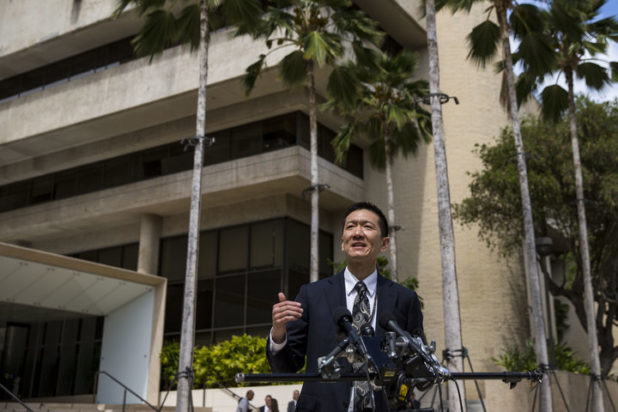Andrew Anglin
Daily Stormer
April 1, 2017
He was born and bred in America, and is a true America. But he doesn’t share our values and principles, because of liberalism.
We here at the Daily Stormer have stopped caring about race, and now believe that all races can work together to form a Western civilization. Many non-white races have contributed to Western civilization, and we honor these contributions.
After all, where would we be without tacos?
But Doug Chin, the Chinese judge suing Donald Trump, is an example of the wrong kind of “assimilation.” He is a mis-assimilator.
Instead of holding onto his Chinese identity, he needs to accept that he is now a member of the West – a “man of the west,” as Jared Taylor would say – and he must adopt our identity.
Huffington Post:
Douglas Chin says his 18-year-old daughter views her racial background very differently than he did his own when he was growing up. As one of the few Asians ― and minorities ― at his high school in Washington state, Chin says he was always aware that he was Chinese-American. So when his daughter told him that she doesn’t really focus on her friends racial backgrounds, he took note.
Her view of race makes sense, the 50-year-old Hawaii attorney general says. His daughter is mixed race ― half Chinese and half Caucasian ― and she was born and raised in Hawaii, one of the most diverse states in the country with the largest population of multiracial Americans.
But it’s the way she views the diversity around her that motivates Chin to keep fighting against the president’s controversial travel ban ― an order which Chin calls discriminatory against Muslims and people from Middle Eastern countries.
It’s about security, Chin.
We want Islamics to come in, we just don’t want them to be the extreme type of Islamic.
We want the BASED MUSLIMS, who really understand what it means to love America, the Constitution and freedom.
We don’t care what race you are, as long as you have Western values.
“Growing up as Americans, we’ve always been trying to appreciate and value diversity,” Chin told The Huffington Post. “To see that eroding and going away is chilling.”
Hawaii became the first state to file a lawsuit against Trump’s revised executive order which restricts travel from six Muslim majority countries. A federal judge agreed with Chin’s arguments in court that Trump’s order likely violated the establishment clause of the First Amendment, which forbids the government from discriminating based on religion.
On March 29, Chin went back to court to successfully argue why Trump’s ban should be halted indefinitely, saying the president’s “religious animus taints the entire policy.”
“We cannot fault the president for being politically incorrect,” Chin said in court. “But we do fault him for being constitutionally incorrect.”
Unlike his daughter, Chin did not grow up in Hawaii. He was born and raised in a predominantly white community in Bellevue, Washington. His parents were Chinese immigrants, but he says they never talked to their kids about their lives back in China and they never really emphasized the sacrifices they had to make in order to move to the U.S.
“Me and my sister grew up very Americanized and [my parents] wanted to give us that American experience,” Chin told HuffPost. And while Chin’s family adapted to their community, Chin couldn’t escape being singled out as the “token Asian.”
“Growing up Asian, the biggest thing we all know is that there’s this stereotype that we’re scholarly, that we don’t get into confrontations, that we’re very quiet,” Chin said. He found it easy to “fit myself into that mold” because “that’s what everybody expected from me,” Chin added. “I was a lot more aware of being the token Asian friend.”
This racial self-awareness carried into Chin’s years as an undergraduate student at Stanford University. “I remember not always feeling comfortable being seen around a lot of Asians, because it would look like I’m not really integrating with the rest of the community,” he said.
That all changed in 1989 when Chin moved to Hawaii, where Asians (including Chinese, Japanese, Korean, Thai and Filipino) make up 37 percent of the population, according to Pew Research. “All of a sudden, I wasn’t a minority,” Chin said.
In Hawaii, Asians can be “jocks, surfers and musicians,” Chin explained. “I never saw that growing up in Washington.” Free from the “token Asian” stereotype, Chin was able to live in Hawaii with a confidence he didn’t have before. He went on to receive his law degree from the University of Hawaii and worked at the Honolulu prosecutor’s office in 1996.
“When I was speaking to juries or presenting a case, I could have confidence knowing that [people aren’t] looking down on me because I’m Asian or think that I’m quiet,” Chin said. “They’re just going to listen to what I’m saying.”
Chin, Chin, Chin.
We want people to come here. We want Chinamen to come here and marry our women and run our courts and make laws as judges.
What we don’t want is for our values, principles and Constitutions to be undermined.
This isn’t about race. It’s all about values and principles.
 Daily Stormer The Most Censored Publication in History
Daily Stormer The Most Censored Publication in History



